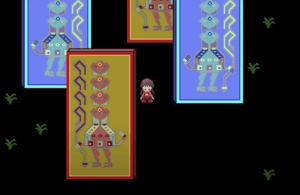I’ve never tried psychedelics, but if I did, I wonder if the experience would be similar to my play testing of Yume Nikki, a Japanese walking-sim game from 2004 where you walk endlessly through a little girl’s dreamy psycho-scape full of random events, never-ending loops, and spooky demons out of the seventh circle of hell.
The game was developed by Kikiyama, who I hope I never meet because what was this guy on! The target audience would be anyone who is interested in mature psychological surrealism and open-ended exploration games. The game is available on PC platforms.
I argue that the game’s central mechanics of open-world walking and interaction with the environment help craft the surreal and introspective experience that many players are looking for, but the the lack of any formal boundaries or clear objectives beyond that in the game do contribute to feelings of aimlessness and confusion for new players. Drawing on the MDA framework, I think the game’s core aesthetic of discover and expression could be enhanced by adding more Narrative and Challenge elements to the gameplay that maintain the enigmatic allure of the game while providing a few more leading clues to limit the pitfalls of aimlessness.
The ‘success’ mechanic of the game involves collecting ‘effects’ that give you new abilities (sometimes new outfits even) and allow you to unlock new explorable areas in the open world. However, the game is vast and offers minimal guidance which leads to an emergent dynamic of frustration, especially when you find yourself stuck in the infinite loops placed in every location. The game expects you to pick up on subtle narrative hints to know how to break out of these loops but sadly in my play-through these were often lost on me. For example, walking in different directions might cause doors to become different sizes for example when you looped back around to them, but if you take a ‘wrong’ turn then you’d be back where you started. One suggestion to potentially improve the player experience would be to layer a few more signposts or objectives inside the loops, or perhaps allow an option for players looking for a more casual experience to toggle on cues to help guide them through the dream world. One specific improvement would be a greater level of explanation for what new effects are meant to do. For example, in my play-through I acquired a ‘hand’ effect that turned my head into a severed hand, but it wasn’t clear to me at all what this signified, so a more explicit new mechanic attached to new effects I think would add a lot to the gameplay.

I recognize that the looping worlds and challenge of finding your way in ambiguous circumstances is likely a main attractor for many players, but sadly I wouldn’t say this worked for me and actually detracted from the surrealist experience I was hoping for in a sim-walking game. For example, I’m familiar with Dear Esther, and this game offers a lot more narrative and environmental storytelling to help guide players through its distinctive landscape, always granting the player some sense of purpose. It seems Yume Nikki is going for a very specific audience and player experience that I think they achieve well. I can certainly imagine a sense of in-group superiority that comes from mastering this game and being privy to all the secrets along with other community members who’ve put in the time to master this bizarre world. However, I certainly think that with the addition of a modified ‘easy’ mode the game might be able to appeal to the submission-fun type gamers and help such players more fully enter the unique aesthetic that this game so unapologetically achieves in its challenge and confusion dynamics.
One final note, the surreal content itself might not appeal to all viewers. For example, I encountered one scene of distorted faces bleeding tears that I found rather unpleasant.

From a game design perspective, whether this ‘works just comes down to player preference. However, I will say it would be an interesting MOD to mark certain doors as ‘violence’ or ‘disturbing image’ free to appeal to a more inclusive range of gamers.




